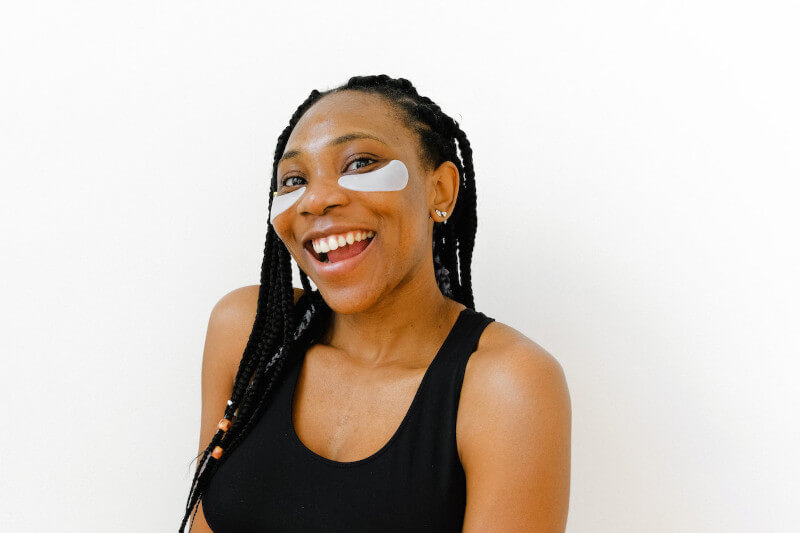The dark circles around your eyes aren’t just because you binged on your favorite show last night or took that overtime at work. Periorbital dark circles, those ominous-looking shadows, tell a tale more than just your exhaustion. They’re a complex interplay of genetics, skin physiology, and sometimes, our daily habits.
Skin Tells a Story
When you notice someone’s eyes, perhaps glistening after a heartfelt laugh or glinting mischievously, do you ever notice the thin skin around them? This periorbital skin, almost paper-thin at roughly 0.5 mm compared to the rest of your body’s 2 mm skin, is a window to the blood vessels beneath. This transparency makes those vessels more noticeable and gives us those tell-tale dark circles.
Decoding the ‘Blue’ in Blood
Ever wondered why your veins appear blue? It’s a mesmerizing dance of light and your skin. It isn’t that your blood is singing the blues. In reality, your skin and the tissue beneath it filter out other colors and allow only blue and violet wavelengths to reflect. This phenomenon might vary slightly based on skin tone, which is why some might perceive their veins as green or brown, while those with exceptionally pale skin might see them in a more true-blooded shade of dark purple or red.
The Unyielding March of Time
Time doesn’t spare even the eyes. As we age, our skin loses its bounce and ability to regenerate, becoming even thinner. This is especially noticeable around the eyes, giving even the most well-rested elders those characteristic dark circles. And for those blessed (or cursed) with naturally thinner periorbital skin, this phenomenon is all too familiar.
More Than Just Skin-Deep
Then there’s a condition called periorbital hyperpigmentation, a term that might sound weighty, but essentially means the skin around the eyes producing an extra dose of melanin. It’s like nature’s unwanted eyeshadow, making the area appear darker. This is particularly common among people with darker skin tones. Dermatologists often find themselves addressing this concern, especially in regions with predominantly people of color, leading to a burgeoning niche of specialized cosmetics.
The Culprits You Didn’t Suspect
While genetics plays a starring role in the saga of dark circles, other factors often make surprise appearances. One such sinister-sounding cause is the oxidization of blood leaking from the periorbital vessels. In simple terms, sometimes blood vessels around the eyes might get a little leaky, leading to a characteristic puffiness and darkness. Don’t panic though! It sounds dire but is largely harmless and can be treated.
Age, Sleep, and Those Telltale Bags
You know those bags under the eyes that seem to accompany dark circles like a loyal sidekick? In the young, it’s often due to retaining too much fluid beneath the eyes – perhaps a result of an excessive salty snack, an allergic reaction, or even an ailment. As the years roll on, those bags often take up permanent residence, making the dark circles even more prominent.
Sleep’s Role in the Tale
So, coming back to our initial suspect – sleep deprivation. Does it play a role in this tale of shadows? Absolutely! When you’re running on little sleep, your body, in its wisdom, churns out more cortisol to keep you alert. This wonder hormone has an intriguing side effect; it increases blood volume, dilating those vessels beneath your eyes, and making dark circles more prominent.
The Blame Game
While it’s tempting to point fingers at genetics or even our parents’ insistence on early mornings, remember, our body and its reactions are a culmination of nature, nurture, and our choices. So, while sleep deprivation might lead to some minor cosmetic concerns, it’s essential to understand it’s also subtly influencing other aspects of your health.
Did You Know?
Medications and Dark Circles
Did you know that certain medications can contribute to those pesky shadows under your eyes? That’s right! Some drugs can cause blood vessel dilation, inadvertently making the blood vessels beneath the thin periorbital skin more prominent. It might be a good idea to keep an eye on your medications and see if there’s a correlation.
The Allergy Connection
During allergy season, if you find yourself frequently scratching or rubbing your eyes, you might inadvertently worsen the appearance of dark circles. So, next time you feel that itch, maybe reach out for a cold compress or some soothing eye drops instead.
Sleeping Positions Matter
Your preferred sleeping posture might be another culprit. If you often sleep on your stomach, gravity can work against you, causing fluid to accumulate under your eyes, which can then emphasize those dark circles. Maybe it’s time to experiment with different sleeping positions, and perhaps, find one that’s kinder to your eyes.
The WebMD Warning
As tempting as it is to diagnose every symptom through a quick online search, be wary! For instance, while it’s true that liver disease can cause dark circles, jumping to dire conclusions based solely on a WebMD search might not be the best approach. Remember, dark circles can result from various factors, many of which are harmless. Always consult a medical professional if you’re concerned.
Why Lips and Fingertips Turn Purple
In extreme situations, like suffocation, the lips and fingertips of individuals might turn purple. This alarming color change is due to the severe lack of oxygen making the blood appear a deep red. The same principle that causes veins to appear blue under the skin causes this blood to appear as a deep blue or purple when viewed through the thin skin of the lips or fingernails.
Shadows and Under-Eye Bags
Lighting can be your best friend or your worst enemy, especially when it comes to facial appearance. Under certain lighting conditions, if you have bags under your eyes, the shadows they cast can make dark circles appear even more pronounced. Being aware of your environment and lighting can help in understanding the severity of those circles.
Tips to Combat Dark Circles Under Your Eyes
- Understanding the Cause Firstly, it’s essential to understand the root cause of your dark circles. Is it due to genetics, allergies, or lifestyle factors such as lack of sleep or stress? By pinpointing the cause, you can tailor your solution more effectively.
- Adjust Your Sleep Habits Ensure you’re getting a good night’s sleep, ideally 7-9 hours. The position you sleep in can also impact fluid retention. Try sleeping on your back and elevating your head slightly with an extra pillow to prevent fluid accumulation under your eyes.
- Check Your Meds Review any medications you’re taking. Some can lead to blood vessel dilation. If you suspect your medication might be causing or exacerbating your dark circles, consult with your doctor about potential alternatives.
- Limit Salt Intake Reduce your salt intake. Consuming too much salt can lead to fluid retention, which can emphasize those under-eye bags. Try to opt for fresh foods over processed ones, and consider using herbs and spices for flavor instead of salt.
- Allergy Alleviation If you suffer from allergies, especially ones that cause itchy eyes, consult with a doctor about potential treatments. Frequently rubbing or scratching your eyes can intensify dark circles.
- Skin Care Routine Invest in a good under-eye cream with ingredients like Vitamin C or retinol, which can help reduce pigmentation and stimulate collagen production. Also, always remember to wear sunscreen to prevent further pigmentation.
- Stay Hydrated Drink plenty of water throughout the day. Hydration can help prevent fluid retention and keep your skin looking fresh.
- Dermatological Treatments For persistent dark circles, consider consulting a dermatologist. Treatments such as chemical peels, laser therapy, or fillers might be suitable options.
FAQ: Addressing Your Concerns
Q: Can makeup help hide dark circles?
A: Absolutely! A good concealer, matched to your skin tone, can help mask the appearance of dark circles. Just remember to gently remove makeup at the end of the day to prevent further skin stress.
Q: Are there any natural remedies?
A: Some swear by cold compresses, cucumber slices, or tea bags placed over closed eyes for a few minutes. While these methods can provide temporary relief, they might not address the root cause.
Q: How long before I see improvements?
A: Depending on the cause of your dark circles, you might notice improvements within a few weeks of making lifestyle changes. However, for genetic factors, it might take longer or require dermatological interventions.




